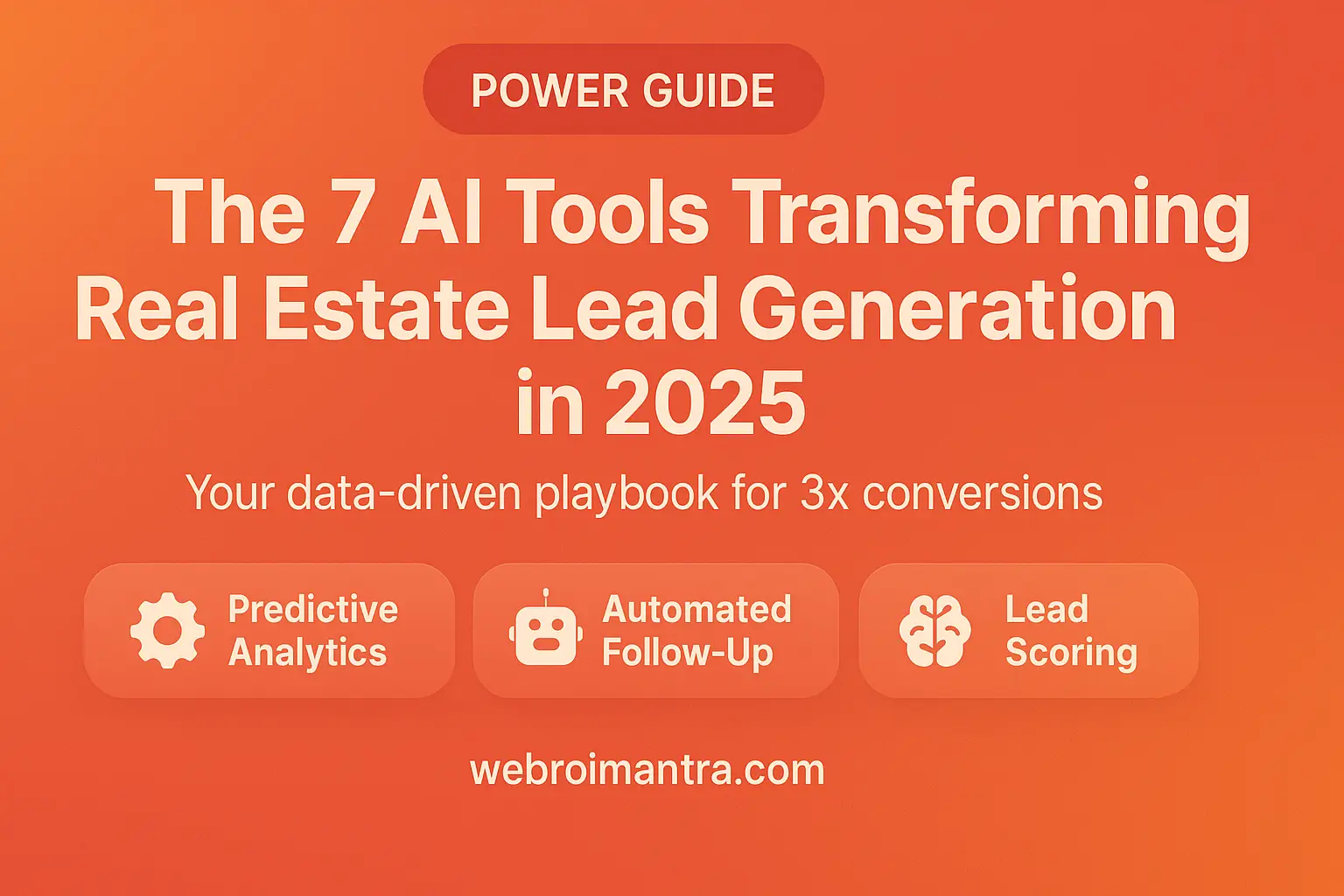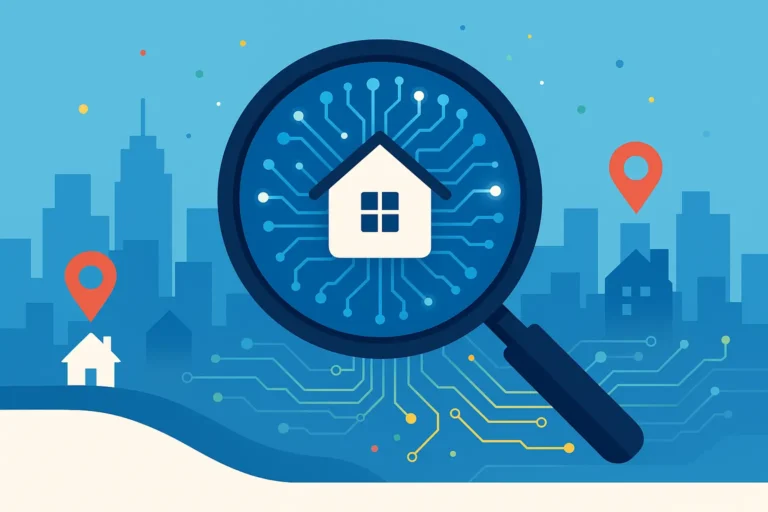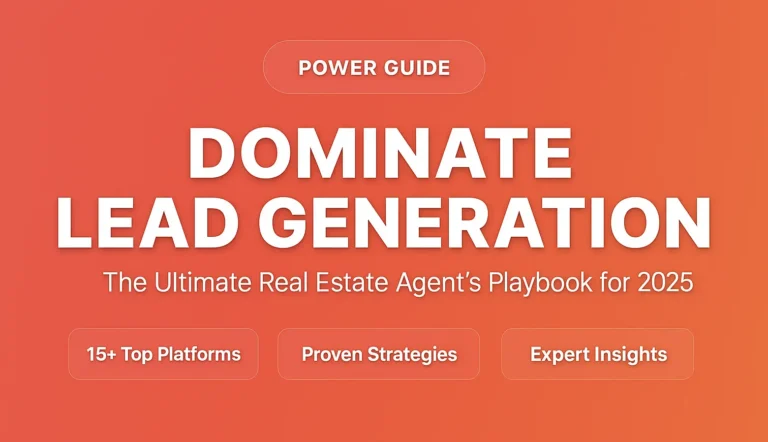The Real Estate AI Stack Every 6-Figure Agent Is Using in 2025
Transform your real estate business from lead-starved to lead-abundant with these proven AI solutions
Picture this: It’s 2 AM, and while you’re sleeping, your AI assistant is having a conversation with a potential buyer who just discovered your listing. By morning, they’ve scheduled a viewing, been pre-qualified, and added to your nurture sequence. This isn’t science fiction anymore. It’s happening right now in real estate offices across the country.
The real estate industry has always been about relationships, timing, and being in the right place at the right moment. But what if you could be everywhere, all the time, providing instant value to every potential client? That’s exactly what artificial intelligence makes possible.
After analyzing dozens of AI tools and speaking with top-performing agents who’ve transformed their businesses, I’ve identified the seven most powerful AI solutions that are genuinely moving the needle for real estate professionals. These aren’t just shiny new toys. They’re profit-generating, time-saving powerhouses that solve real problems every agent faces daily.
The Real Problem: Why Traditional Lead Generation is Broken
Before diving into solutions, let’s acknowledge the elephant in the room. Traditional real estate lead generation is inefficient, inconsistent, and frankly, exhausting.
Most agents spend their days playing phone tag with lukewarm prospects, writing the same property descriptions over and over, and watching qualified leads slip away because they couldn’t respond fast enough. The average real estate professional spends 60% of their time on administrative tasks that don’t directly generate revenue.
Meanwhile, consumer expectations have skyrocketed. Today’s buyers and sellers expect instant responses, personalized communication, and 24/7 availability. They’re researching properties at midnight, comparing agents during lunch breaks, and making decisions faster than ever before.
This creates a perfect storm: agents burning out from manual processes while prospects demand superhuman responsiveness. Enter AI.
The 7 AI Tools That Are Actually Changing the Game
1. Lofty’s AI Assistant: Your 24/7 Lead Conversion Machine
If you’ve ever lost a deal because you couldn’t respond to a lead fast enough, Lofty’s AI Assistant (formerly Chime) will feel like a revelation. This platform doesn’t just capture leads; it actively converts them while you’re focused on other priorities.
What makes it special:
- Engages leads within seconds of their first interaction
- Automatically qualifies prospects using sophisticated conversation flows
- Tracks behavioral patterns to identify the hottest opportunities
- Seamlessly hands off qualified leads to human agents at the perfect moment
Real-world impact: One agent in Austin reported a 47% increase in closed deals within six months of implementation, primarily because the AI prevented leads from going cold during the crucial first 24 hours.
Best for: Busy agents who struggle with timely follow-up and teams looking to standardize their qualification process.
2. Ylopo: The Lead Intelligence Platform That Thinks Like a Top Agent
Ylopo takes a different approach. Instead of just capturing leads, it studies them. The platform analyzes thousands of behavioral signals to determine not just who’s interested, but who’s ready to buy or sell right now.
What sets it apart:
- Predictive scoring that identifies leads most likely to convert within 30 days
- Automated nurture campaigns that adapt based on individual engagement patterns
- Financial readiness assessment that helps agents prioritize their time
- Seamless integration with major CRM platforms
The science behind it: Ylopo’s algorithms analyze over 200 data points per lead, including website behavior, email engagement, social media activity, and demographic information. This creates a comprehensive “buyer readiness score” that’s remarkably accurate.
Best for: Agents who want to work smarter, not harder, and teams looking to dramatically improve their conversion rates.
3. Tidio: The Chatbot That Actually Converts
Most chatbots feel robotic and frustrating. Tidio’s AI is different. It’s designed specifically for real estate and trained on thousands of actual agent-client conversations.
Key capabilities:
- Natural language processing that handles complex property questions
- Automatic viewing schedule coordination
- Lead qualification through conversational forms
- Multilingual support for diverse markets
Pro tip: The most successful Tidio users customize their bot’s personality to match their brand voice. A luxury agent might program formal, sophisticated responses, while a first-time buyer specialist might use a more casual, educational tone.
Best for: Agents with high website traffic who want to capture more leads without increasing their workload.
4. Zillow Premier Agent: Tap Into the Largest Real Estate Database
Love it or hate it, Zillow generates more real estate searches than any other platform. Premier Agent’s AI capabilities help you capture a piece of that massive traffic.
Unique advantages:
- Access to Zillow’s proprietary lead scoring algorithms
- Automated matching with high-intent prospects in your area
- Integrated advertising platform that optimizes ad spend automatically
- Built-in CRM with AI-powered follow-up sequences
Strategic insight: The agents who succeed with Premier Agent don’t just buy leads; they use the platform’s AI to identify patterns in their most successful conversions, then replicate those strategies across other marketing channels.
Best for: Agents in competitive markets who want to leverage Zillow’s massive reach and data advantages.
5. ChatGPT: The Swiss Army Knife of Real Estate AI
While not specifically designed for real estate, ChatGPT has become indispensable for agents who understand how to use it effectively. The key is in the prompting.
Game-changing applications:
- Generating compelling listing descriptions in seconds
- Creating personalized email sequences for different buyer personas
- Drafting social media content that actually engages
- Preparing market analysis reports and client presentations
Power user technique: Create a library of proven prompts for common tasks. For example: “Write a listing description for a [property type] in [neighborhood] that emphasizes [key features] and appeals to [target buyer demographic]. Use an enthusiastic but professional tone and include a compelling call-to-action.”
Best for: Tech-savvy agents who want to dramatically reduce content creation time while maintaining high quality.
6. Lindy: The Virtual Assistant That Never Sleeps
Imagine having a dedicated assistant who never takes a day off, never forgets to follow up, and never has a bad day. That’s Lindy.
Core functions:
- Instant lead response and qualification
- Automated appointment scheduling across multiple calendars
- CRM data entry and maintenance
- Cross-platform integration with over 2,500 business apps
The multiplication effect: Lindy doesn’t just handle individual tasks; it creates workflows that connect multiple systems. A lead captured on Facebook can automatically trigger a welcome email, create a CRM record, schedule a follow-up call, and add the prospect to a targeted advertising audience.
Best for: Solo agents who need to scale their operations and small teams looking to punch above their weight.
7. Matterport: Turn Every Listing Into a Lead Magnet
In a world where buyers start their search online, Matterport’s 3D virtual tours have become a competitive necessity. But the AI-powered features go far beyond pretty visuals.
Advanced capabilities:
- Automatic floor plan generation from 3D scans
- AI-powered property measurement and room labeling
- Integrated lead capture through immersive experiences
- Analytics that show exactly how prospects interact with your listings
Competitive advantage: Properties with Matterport tours receive 95% more calls than traditional listings. But the real power is in the data. You can see exactly where prospects spend time, which rooms they revisit, and how long they engage with each listing.
Best for: Listing agents in competitive markets and luxury specialists who need to differentiate their marketing.
The Strategic Implementation Framework
Having the right tools is only half the battle. The difference between agents who see massive ROI from AI and those who struggle comes down to implementation strategy.
Phase 1: Audit Your Current Process (Week 1)
Before adding any AI tools, document your existing lead generation process. Track these metrics for one week:
- Average response time to new leads
- Conversion rate from lead to appointment
- Time spent on administrative tasks daily
- Number of leads that go cold without proper follow-up
This baseline will help you measure the impact of your AI implementation and identify which tools will provide the biggest immediate benefit.
Phase 2: Start with Your Biggest Pain Point (Weeks 2-4)
Don’t try to implement everything at once. Choose the one AI tool that addresses your most pressing challenge:
- Slow response times? Start with Tidio or Lofty’s AI Assistant
- Poor lead quality? Begin with Ylopo’s predictive scoring
- Content creation bottleneck? Implement ChatGPT workflows first
- Inefficient follow-up? Deploy Lindy as your virtual assistant
Phase 3: Optimize and Expand (Months 2-3)
Once your first AI tool is running smoothly, analyze the data to identify optimization opportunities. Then gradually add complementary tools that enhance your existing workflows.
Phase 4: Create AI-Powered Systems (Months 4-6)
The real magic happens when your AI tools work together. Create integrated workflows where:
- Matterport captures leads from virtual tours
- Tidio qualifies them through conversational forms
- Ylopo scores them for purchase readiness
- Lindy schedules appropriate follow-up actions
- ChatGPT personalizes ongoing communication
Measuring Success: The Metrics That Matter
Traditional lead generation metrics don’t tell the whole story when AI is involved. Focus on these advanced KPIs:
Lead Quality Indicators:
- Percentage of leads that convert to appointments within 48 hours
- Average time from first contact to contract signing
- Lead-to-close ratio by source and AI tool
Efficiency Metrics:
- Time saved on administrative tasks per week
- Cost per qualified lead across different AI platforms
- Revenue per hour of active agent time
Engagement Analytics:
- Response rate to AI-generated content vs. manual content
- Engagement time with AI-powered property tours
- Follow-up sequence completion rates
Advanced Strategies for Maximum Impact
The Hybrid Approach
The most successful agents don’t replace human interaction with AI; they use AI to enhance every human touchpoint. For example:
- AI qualifies leads and schedules appointments
- Human agents conduct the actual showings
- AI follows up with personalized thank-you messages and next steps
- Human agents handle negotiations and closing
Personalization at Scale
Use AI to create hyper-personalized experiences for every lead:
- Segment prospects based on AI-generated behavioral profiles
- Customize property recommendations using predictive algorithms
- Tailor communication frequency and channel preferences automatically
- Create unique buyer journey maps for different persona types
Competitive Intelligence
AI tools can help you stay ahead of market trends:
- Monitor competitor pricing and marketing strategies
- Identify emerging neighborhood trends before they become obvious
- Track successful listing strategies in your market
- Analyze seasonal patterns in buyer behavior
Common Pitfalls and How to Avoid Them
Over-Automation Without Human Oversight
AI should enhance human judgment, not replace it. Regularly review AI-generated content and decisions to ensure they align with your brand values and market reality.
Ignoring Data Privacy Concerns
With great data comes great responsibility. Ensure your AI tools comply with local privacy regulations and always be transparent with clients about how their information is used.
Setting Unrealistic Expectations
AI is powerful, but it’s not magic. Set clear expectations with your team and clients about what AI can and cannot do. Focus on measurable improvements rather than revolutionary overnight changes.
The Future of AI in Real Estate
Looking ahead, we’re only scratching the surface of AI’s potential in real estate. Emerging technologies to watch include:
Predictive Market Analysis: AI that can forecast neighborhood trends with unprecedented accuracy Virtual Reality Integration: Immersive property experiences that go beyond current 3D tours Blockchain Integration: Smart contracts that automate transaction processes Advanced Natural Language Processing: AI that can handle complex legal and financial questions
ROI Analysis: What to Expect
Based on case studies from successful implementations, here’s what agents typically see:
Month 1-2: 20-30% improvement in response times, 15% increase in lead capture Month 3-4: 25-40% reduction in administrative time, 20% improvement in lead quality Month 5-6: 30-50% increase in overall conversion rates, 35% improvement in client satisfaction scores
The initial investment in AI tools typically pays for itself within 90 days for most agents, with continued ROI improvements over time.
Your Next Steps
Ready to transform your real estate business with AI? Here’s your action plan:
- Week 1: Conduct a thorough audit of your current lead generation process
- Week 2: Choose one AI tool that addresses your biggest pain point
- Week 3: Implement your chosen tool with proper training and setup
- Week 4: Monitor results and optimize based on initial data
- Month 2: Expand to complementary AI tools that enhance your existing workflows
- Month 3: Create integrated systems that maximize the synergy between different AI platforms
Frequently Asked Questions
Q: How much should I budget for AI tools as a real estate agent? A: Budget varies significantly based on your business size and needs. Solo agents can start with basic plans around $50-200 per month, while teams might invest $500-2000 monthly for comprehensive solutions. The key is to start small and scale based on ROI. Most agents see positive returns within 60-90 days, making the investment self-funding.
Q: Will AI tools work in smaller markets with less online activity? A: Absolutely. In fact, AI can be even more valuable in smaller markets where personal attention is crucial. AI handles routine tasks, freeing you to focus on relationship-building. Tools like ChatGPT for content creation and Lindy for follow-up work regardless of market size. The key is choosing tools that enhance your existing strengths rather than trying to replace them.
Q: How do I ensure AI-generated content maintains my personal brand voice? A: The secret is in the setup and ongoing refinement. Start by feeding AI tools examples of your best existing content. Create detailed style guides that specify your tone, preferred phrases, and communication style. Regularly review and edit AI outputs, then use those refinements to train the system further. Most successful agents spend 2-3 hours initially setting up their AI voice, then 30 minutes weekly fine-tuning.
Q: What happens if an AI tool makes a mistake with a client? A: This is why human oversight remains crucial. Never let AI tools operate completely autonomously, especially in client-facing situations. Set up approval workflows for important communications, implement regular quality checks, and always have escalation procedures. Most AI tools offer audit trails so you can track and correct issues quickly. The key is positioning AI as an assistant, not a replacement for your judgment.
Q: How do I train my team to use AI tools effectively? A: Start with comprehensive onboarding that covers both technical aspects and strategic applications. Create standard operating procedures for each tool, establish clear guidelines about when to use AI versus human judgment, and implement regular training sessions to share best practices. Most importantly, lead by example and celebrate early wins to build team confidence with the technology.
Q: Can AI tools help with commercial real estate, or are they mainly for residential? A: While many AI tools started with residential focus, they’re increasingly valuable for commercial real estate. Tools like ChatGPT excel at creating commercial property descriptions and market analyses. Matterport is particularly powerful for commercial spaces. Ylopo and similar platforms can be customized for commercial lead qualification. The key is adapting the tools to commercial buying cycles and decision-making processes.
Q: How do I handle clients who are uncomfortable with AI involvement? A: Transparency and education are essential. Explain how AI enhances your service rather than replacing personal attention. Focus on benefits like faster response times and more thorough market analysis. Many clients appreciate knowing you’re using cutting-edge tools to serve them better. For those still uncomfortable, emphasize that AI handles background tasks while all personal interactions remain human-driven.
Q: What’s the learning curve for implementing these AI tools? A: Most tools offer intuitive interfaces, but expect 2-4 weeks to become proficient. Simple tools like ChatGPT can be productive within days, while comprehensive platforms like Lofty or Ylopo might take a month to fully optimize. The key is starting with basic features and gradually expanding usage. Most providers offer excellent onboarding support and training resources.
Q: How do I measure if AI tools are actually improving my business? A: Focus on leading indicators like response time, lead qualification rates, and time spent on administrative tasks, as well as lagging indicators like conversion rates and revenue per lead. Set up tracking systems before implementation to establish baselines. Most agents see measurable improvements in efficiency within 30 days and revenue impact within 90 days.
Q: Are there any legal or ethical considerations when using AI in real estate? A: Yes, several important considerations. Ensure AI-generated content complies with fair housing laws and doesn’t inadvertently discriminate. Be transparent about AI usage in your marketing materials. Verify that AI tools comply with local privacy regulations and MLS rules. Always review AI-generated contracts or legal documents with qualified professionals. When in doubt, consult with a real estate attorney familiar with AI applications.
Conclusion: Your Competitive Advantage Awaits
The real estate industry is experiencing its most significant technological transformation in decades. AI isn’t just changing how we generate leads; it’s revolutionizing how we serve clients, manage our time, and build sustainable businesses.
The agents who embrace these tools now, while the majority are still hesitating, will establish an insurmountable competitive advantage. They’ll capture more leads, convert them faster, and deliver exceptional service while working fewer hours.
But here’s the crucial point: AI tools are only as powerful as the strategy behind them. The most successful agents don’t just adopt technology; they thoughtfully integrate it into a comprehensive business system designed for maximum impact.
Your clients deserve the best possible service. Your family deserves your time and attention. Your business deserves to thrive in an increasingly competitive market. AI makes all of this possible, but only if you take action.
The future of real estate belongs to agents who combine human expertise with artificial intelligence. The question isn’t whether you’ll eventually use these tools. The question is whether you’ll be a leader or a follower in this transformation.
Start today. Choose one tool that addresses your biggest challenge. Implement it properly. Measure the results. Then expand strategically.
Your most successful year in real estate is waiting. It’s time to claim it.








5 Comments